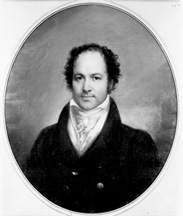Benjamin Watkins Leigh
| Benjamin Watkins Leigh | |
| First Lieutenant and then Commander of the Petersburg Republican Light Infantry | |
| In office | |
| 1807-1812 (?) | |
| Representative for Dinwiddie County in the State House of Delegates | |
| In office | |
| December 2, 1811 to February 23, 1813 | |
| Representative in the State Constitutional Convention | |
| In office | |
| 1829-1830 | |
| Representative for Henrico County in the State House of Delegates | |
| In office | |
| 1830-1831 | |
| U.S. Senator | |
| In office | |
| 1834-1836 | |
| Succeeded by | William Cabell Rives |
| Reporter of the Supreme Court of Appeals in Virginia | |
| In office | |
| 1839-1841 | |
| Personal details | |
| Born | June 18, 1781 |
| Chesterfield County, Virginia | |
| Died | February 2, 1849 |
| Richmond, Virginia | |
| Resting place | Shockoe Hill Cemetery |
| Education | The College of William & Mary |
| Profession | lawyer, soldier, politician |
| Spouse(s) | Mary Selden Watkins, Susanna Colston (niece of Chief Justice John Marshall, Julia Wickham (daughter of John Wickham) |
| Relatives | brother of William Leigh, Circuit Court Judge of Halifax. |
| Known for | his court reports and southern conservatism |
Benjamin Watkins Leigh (1781 – 1849) was born in Chesterfield County, Virginia to William Leigh, an Episcopalian minister, and Elizabeth Watkins.[1] After his father died in 1787, Leigh and his younger brother William were educated by a private tutor, Needler Robinson.[2]
Like his father, Leigh attended the College of William & Mary. Leigh studied under St. George Tucker and possibly George Wythe.[3] Leigh graduated in 1802, at which time he was accepted to the bar and began practicing in Petersburg, Virginia.[4] That same year, Leigh married his cousin, Mary Selden Watkins, with whom he had one child.[5]
After representing Dinwiddie County in the House of Delegates from 1811 to 1813 (and again in 1822), Leigh moved his legal practice to Richmond and became a prominent attorney.[6] In 1819, the legislature requested Leigh to direct the compilation and publishing of the Code of Virginia. During his time in the General Assembly, Leigh represented Virginia in negotiations with Kentucky over legal claims arising from Kentucky having been originally a part of Virginia. However, neither state accepted Leigh's compromise plan.[7]
Throughout his political career, Leigh steadfastly opposed Andrew Jackson, believing that Jackson lacked ability as a political leader and erred in his policy that the writ of habeas corpus did not apply in U.S. territories.[8] Leigh defended the Virginia Constitution, property qualifications for voting, and disagreed with ideas of electoral districts and proportional representation. At the state constitutional convention of 1829-1830, Leigh became a conservative leader and successfully preserved an apportionment system favoring the planters. In 1830, he was again elected to the House of Delegates, this time representing the county of Henrico.[9]
In 1834, Leigh was appointed to replace William Cabell Rives in the U.S. Senate. Leigh narrowly won the 1835 election by two votes but resigned from the Senate in 1836. Leigh resumed his legal practice, and in 1829 he became the court reporter for the Virginia Supreme Court of Appeals. In 1835, the College of William & Mary honored him with a doctorate in laws.[10]
Leigh is primarily known for his court reports and for his "early articulation of a southern conservatism."[11] An aristocratic Virginian, he believed in preserving traditional forms of government and ways of life, including slavery.[12]
Leigh had eleven children from his three wives, Mary Selden Watkins, Susanna Colston, and Julia Wickham.[13] He died in Richmond on February 2, 1849 and is buried in Shockoe Hill Cemetery.[14]
See also
- History of the Harvard Law School
- Jefferson and the Virginia Constitution
- John Wickham
- Love against Donelson
- William and Mary, the First American Law School
- Wythe's Lost Papers
- Wythe the Teacher
References
- ↑ American National Biography Online, s.v."Leigh, Benjamin Watkins," by F. Thornton Miller, accessed November 9, 2015.
- ↑ Cline Edwin Hall, "The political life of Benjamin Watkins Leigh," (master's thesis, University of Richmond, 1959), accessed online November 30, 2015.
- ↑ "Leigh, Benjamin Watkins."
- ↑ Ibid; Clement Eaton, "Southern Senators and the Right of Instruction, 1789-1860," The Journal of Southern History, Vol. 18, No. 3 (Aug., 1952), pp. 303-319, 3, accessed November 9, 2015.
- ↑ Eaton, "Southern Senators and the Right of Instruction, 1789-1860," 3.
- ↑ "Leigh, Benjamin Watkins."
- ↑ Ibid.
- ↑ Hall, "The political life of Benjamin Watkins Leigh," 23.
- ↑ "Leigh, Benjamin Watkins."
- ↑ Ibid.
- ↑ Ibid.
- ↑ Hall, "The political life of Benjamin Watkins Leigh," 77-78.
- ↑ Ibid, 5.
- ↑ "Benjamin Watkins Leigh (1781-1849)," Find A Grave (2002), accessed online December 1, 2015.
Further reading
- Clement Eaton, "Southern Senators and the Right of Instruction, 1789-1860. The Journal of Southern History, Vol. 18, No. 2 (Aug., 1952), pp. 303-319.
